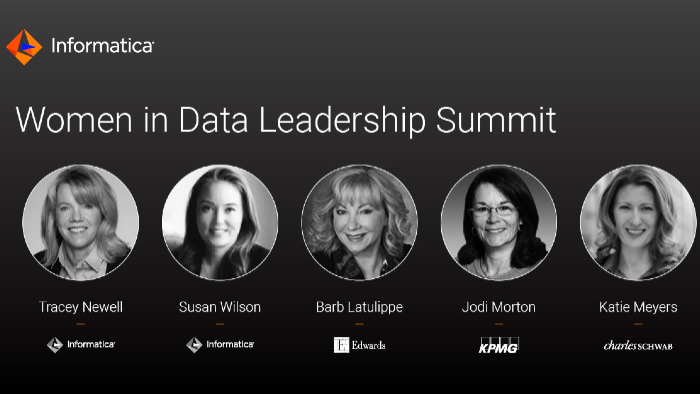Women in Data: How Leaders Are Driving Success
As organizations across the board face new challenges in these disruptive times, now more than ever data leaders need strategies that deliver business value. In conversations with customers, I’ve heard first-hand how important it is to create a data strategy that’s based on business outcomes. To develop these strategies and succeed in the digital age, organizations must tap into the potential of women, according to Forbes.

Last week I had the pleasure of hosting a virtual gathering of women data leaders with Informatica President Tracey Newell. Together with a panel of leaders from Edward Life Sciences, KPMG, and Charles Schwab, we explored what’s top of mind for women in data and what advice they would offer to the up-and-coming generation of women in data.
Our panelists shared how they’re working to increase data literacy, drive better decision-making with cloud, and enable self-service analytics for their organizations. Each of them also offered insights into how to make your voice heard in a productive way. Here are some key takeaways from our discussion.
Democratizing Data Throughout the Enterprise
Next-gen analytics have helped to shift perception and enable the business to accelerate the use of data, according to panelist Barb Latulippe, Sr. Director Enterprise Data at Edward Life Sciences, who emphasized the trend toward self-service in enterprise data management. The days of the business going to IT are gone—a data marketplace provides a better user experience. Coupled with an effort to increase data literacy throughout the enterprise, such data democratization empowers users to access the data they need themselves, thanks to a common data language.
This trend was echoed by panelist Katie Meyers, senior vice president at Charles Schwab responsible for data sales and service technologies. A data leader for 25 years, Katie focused on the role cloud plays in enabling new data-driven capabilities. Katie emphasized that we’re living in a world where data grows faster than our ability to manage the infrastructure. By activating data science and artificial intelligence (AI), Charles Schwab can leverage automation and machine learning to enable both the technical and business sides of the organization to more effectively access and use data.
And ultimately all data problems affect the financial performance of the organization. Panelist Jodi Morton, chief data officer (CDO) at KPMG, stressed the importance of understanding where data resides, and of governing and managing it to provide insights and services to customers and help ensure the best business outcomes.
Getting Buy-In for Your Data Strategy
At KPMG, Jodi makes an effort to connect data strategy to business strategy, evaluating how data lake and master data management initiatives impact business outcomes. As CDO, Jodi sees herself as chief storyteller: How do you help the organization do something better, faster, etc.? Regardless of the culture and organizational structure of your company, messaging and support from the top are crucial for success.
Barb emphasized the importance of marketing your data strategy by partnering with key in-flight projects, starting small and building on your success. You can enable the business with expertise and training. An ability to speak using business terms helps to communicate your data strategy to stakeholders throughout the organization.
By building relationships with executives and helping them to understand how to use data and analytics to solve business problems, you can get buy-in for your data strategy, rather than having technical discussions. You should also share your roadmap and strategy with the governance council, Barb recommends.
Katie advises that data strategy be both broad and deep. It needs to have multiple layers, with a technical foundation and a second layer that lays out the business understanding and connection. In the final layer, business approves the data, acknowledges that they can use it the way they want, and outlines what the next generation of strategic bets will be.
Succeeding in Data as a Woman
I’ve spent my career first in leading a data practice at Pfizer, then leading consulting services for data governance. Initially I didn’t think I was prepared for a role leading a business function in sales, but a leader pushed me to make this move—and I would never have found my voice and a whole new set of skills if I hadn’t. Unique data roles are popping up everywhere! My advice to women in data is, don’t get complacent in your role. Take the bold moves to leverage your strengths but stretch your comfort zone—you’ll find a whole new world of experiences you never thought possible!
The panelists shared similar perspectives. As an engineer, Katie had to get comfortable working with men without having to be one. Leveraging strengths of collaboration and empathy helped her move forward, along with having the courage to leave the table when she stopped getting respect. Her advice is to push yourself outside your comfort zone and pull others outside their comfort zones. And, even if you think you have the answer, get a second opinion, and never stop learning.
In two companies that she worked for Barb found herself the only female on staff. In situations like that, you must be confident, have a voice, and use it. Seek out mentors and be a mentor, she advises, and go for jobs even if you think you are not 100% qualified. You don’t need perfection.
Jodi has similar advice: Take a risk, bring your “A” game, and network. Don’t make it about technology—it’s about people and relationships. You have to be willing to try new things and broaden your skills, thinking creatively on how to meet job descriptions. Be comfortable and confident in your ability to learn. Surround yourself with people who fill in your gaps—and listen to them.
Next Steps
To learn more about how to link data strategy to business strategy, check out The Data Strategy Playbook. I would love to hear your thoughts as well. What has your experience been as a woman in data? What has shaped your career, and what advice would you offer to women in this field? Reach out to me at swilson@informatica.com.








